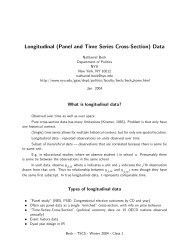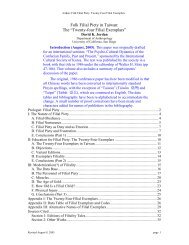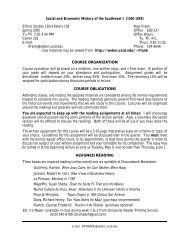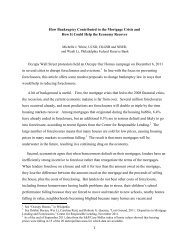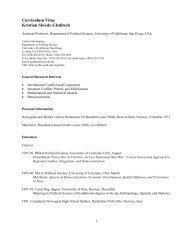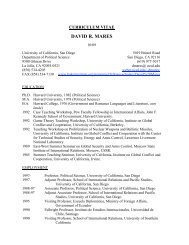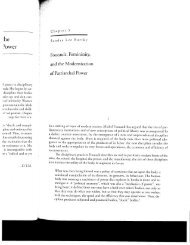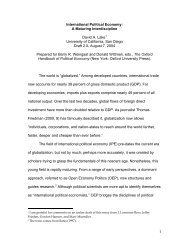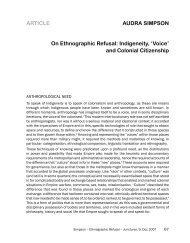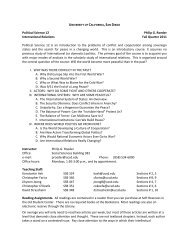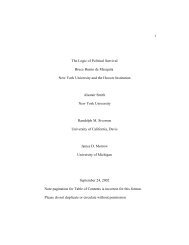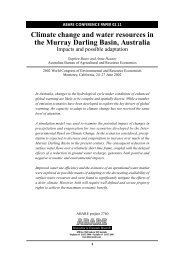Disciplines Unbound: Notes on Sociology and Ethnic Studies
Disciplines Unbound: Notes on Sociology and Ethnic Studies
Disciplines Unbound: Notes on Sociology and Ethnic Studies
You also want an ePaper? Increase the reach of your titles
YUMPU automatically turns print PDFs into web optimized ePapers that Google loves.
510 Symposia<br />
management is notforevery<strong>on</strong>e. It is acomfort- ideas into management. Since I like moving<br />
able locati<strong>on</strong> <strong>on</strong>ly if you are willing to move between disciplines <strong>and</strong> between theory <strong>and</strong><br />
bey<strong>on</strong>d the boundaries of sociology <strong>and</strong>, at the practice, I wouldn't trade places with any<strong>on</strong>e.<br />
same time, are inclined to bring sociological<br />
<str<strong>on</strong>g>Disciplines</str<strong>on</strong>g> <str<strong>on</strong>g>Unbound</str<strong>on</strong>g>: <str<strong>on</strong>g>Notes</str<strong>on</strong>g> <strong>on</strong> <strong>Sociology</strong> <strong>and</strong> <strong>Ethnic</strong> <strong>Studies</strong><br />
YEN LE ESPIRITU<br />
University of California, San Diego<br />
The new social movements of the 1960s <strong>and</strong> sociology, the Chicago School sociologists spoke<br />
the post-1965 increases in racialized immigrant powerfully to the social issues of industrializati<strong>on</strong><br />
populati<strong>on</strong>s transformed the academy, usher- <strong>and</strong> urbanizati<strong>on</strong> through their attenti<strong>on</strong> to<br />
ing in new subjects of social knowledge as well as everyday experience. In the late 1950s, C.<br />
new critical social knowledges (Seidman 1994). Wright Mills's The Sociological Imaginati<strong>on</strong> advo-<br />
These new subjects posed new questi<strong>on</strong>s, chal- cated a critical social science, urging sociologists<br />
lenged the dominant paradigms of academic dis- to commit themselves to an activist critique <strong>and</strong><br />
ciplines, <strong>and</strong> c<strong>on</strong>tested the separati<strong>on</strong> of rec<strong>on</strong>structi<strong>on</strong> of society. But there were also<br />
knowledge <strong>and</strong> politics. The new critical knowl- prominent countertrends; in particular, during<br />
edge seeped into the traditi<strong>on</strong>al disciplines, but the postwar decades, the growth of the research<br />
took full shape in the emerging interdisciplinary university <strong>and</strong> of funding sources for the social<br />
fields of <strong>Ethnic</strong> <strong>Studies</strong>, Women's <strong>Studies</strong>, Third sciences "scientized" sociology (L<strong>on</strong>g 1997:<br />
World <strong>Studies</strong>, Cultural <strong>Studies</strong>, <strong>and</strong> Queer 9-10). Anchored in positivist epistemologies,<br />
<strong>Studies</strong>. It was amid this changing intellectual the disciplinary mainstream of sociology became<br />
<strong>and</strong> political milieu that I entered the United increasingly more specialized <strong>and</strong> corresp<strong>on</strong>d-<br />
States <strong>and</strong> eventually the university. Arriving ingly less engaged with related disciplines; its<br />
from Vietnam in 1975 <strong>and</strong> entering higher edu- claim to universal <strong>and</strong> objective knowledge also<br />
cati<strong>on</strong> in the early 1980s, I inherited a more moved the field away from an explicit commit-<br />
democratized <strong>and</strong> diversified university <strong>and</strong> a ment to social activism (Sprague 1998).<br />
more critical <strong>and</strong> politicized body of social Paradoxically, even as sociologists wrestled<br />
knowledge. By the time I began graduate school with issues of power, c<strong>on</strong>flict, <strong>and</strong> inequality,<br />
in the mid-1980s, I had come to view the uni- they have largely neglected or subordinated race<br />
versity as a potentially important site for <strong>and</strong> thus have missed the manner in which race<br />
activism a site to generate critical social has been "a fundamental axis of social organiza-<br />
knowledge <strong>and</strong> practices aimed at social change. ti<strong>on</strong> in the U. S." (Omi <strong>and</strong> Winant 1994: 13).<br />
Focusing my scholarship <strong>on</strong> comparative race The great social theorists of the nineteenth cen-<br />
<strong>and</strong> ethnic relati<strong>on</strong>s, I received my graduate tury all predicted that race <strong>and</strong> ethnicity c<strong>on</strong>-<br />
training in sociology but have worked since then ceptualized as remnants of a preindustrial<br />
in the interdisciplinary field of <strong>Ethnic</strong> <strong>Studies</strong>. It order would decline in significance in modern<br />
is the relati<strong>on</strong>ship between sociology <strong>and</strong> <strong>Ethnic</strong> society. For example, the classical Marxist<br />
<strong>Studies</strong> both the gaps <strong>and</strong> the overlaps that I underst<strong>and</strong>ing that capital seeks "abstract labor"<br />
will attempt to sketch in this brief essay. overlooks the ways in which capital has profited<br />
At its best, sociology grapples seriously <strong>and</strong> precisely from the "flexible" racializati<strong>on</strong> <strong>and</strong><br />
effectively with issues of social inequality, pow- gendering of labor. In the United States, before<br />
er, <strong>and</strong> collective acti<strong>on</strong>. From its incepti<strong>on</strong>, the 1 960s, much of the sociology of race<br />
sociology has asked difficult questi<strong>on</strong>s about expressed assimilati<strong>on</strong>ist principles <strong>and</strong> predict-<br />
important social issues <strong>and</strong> believed that it could ed that with each succeeding generati<strong>on</strong>, U.S.<br />
inform social acti<strong>on</strong> in answering them. The ethnic groups would improve their ec<strong>on</strong>omic<br />
founding sociologists Marx, Weber, Durk- status <strong>and</strong> become progressively more similar to<br />
heim, Simmel, <strong>and</strong> others all resp<strong>on</strong>ded to the the "majority culture" (Park 1950; Gord<strong>on</strong><br />
crises of emerging industrial capitalism <strong>and</strong> 1964). Developed to explain the experiences of<br />
intended to shape the course of historical events European immigrants <strong>and</strong> their children, this<br />
through their social theories. Within American assimilati<strong>on</strong>ist framework did not differentiate




